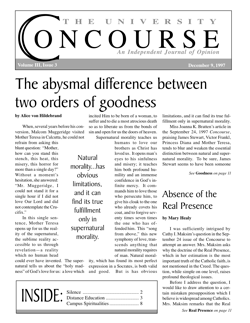How might we improve our education for both residents and DE students?
by Nicholas J. Healy
As might be expected, John Crosby has raised some profound and telling points against Distance Education as it is currently envisioned. So persuasive is he of the value of personal dialog, mentoring, and witness, that his comments cannot help but highlight deficiencies in our existing mode of education here in Steubenville.
As it is, we know that only a small fraction of our students actually receive active mentoring from the faculty. Reflecting a general problem endemic to today’s universities, a large percentage of our students have relatively little contact with the faculty outside the classroom. Yet the faculty are already burdened with heavy teaching loads, and any formal requirement of taking on special mentoring roles seems out of the question. Rather, we will likely have to rely on encouraging more informal mentoring and “intellectual formative” roles, using staff, part time faculty, and perhaps graduate students to interact with younger undergraduates. If the whole University were to recognize and assume this responsibility, no doubt many creative ways would emerge for the development of a true Catholic intellectual culture that engages a higher percentage of our students.
Dr. Crosby’s insights ought to stimulate means of achieving more authentic education, whether or not the student is on our campus. For example, suppose in a given area a group of people sign up for a Distance Education course. Could they not get together periodically for a seminar on the subject, perhaps facilitated by an alumnus or even a knowledgeable person with the right academic credentials and motivation? Alternately, suppose “roving mentors” were hired, periodically to converse with, witness to, and direct the studies of students in more isolated areas.
Of course with Distance Education the students would not be interacting with the professor (or least not in person). Just as noted, this is already only possible on a very limited basis. If we must rely on substitutes for those key roles of mentoring guidance and dialog, perhaps substitutes can be found for Distance Education students in their home environment. It may be more difficult, especially for those in rural areas, but the University has such a far-reaching network of priests, graduates and academics in accord with our vision that it may well be possible. If some standards could be set for a quantum (and quality) of personal interaction with qualified intellectuals would this satisfy those concerned with Distance Education’s lack of the traditional educational milieu? Perhaps it would be worth exploring.
Mr. Healy is FUS Vice President for University Relations.


